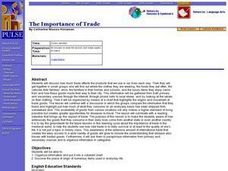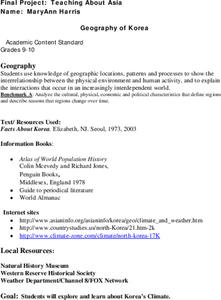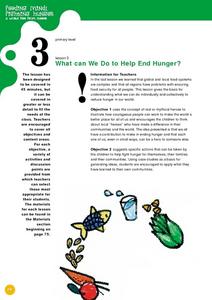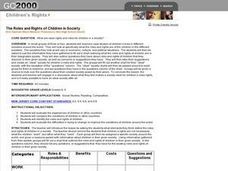Curated OER
Religions of Japan
Students explore, analyze and study the religions that originated in Japan, including Shintoism and Zen Buddhism. They assess the beliefs of each religion and compare/contrast all the Eastern Religions and view their people and...
Curated OER
Homeschooling Chronicles - Teaching a Foreign Language
Foreign languages can enrich curriculum. Learning another language help students practice grammar skills and broaden their horizons.
Curated OER
Peak Oil
Pupils explore the finite petroleum resources available and the surging demand for fossil fuels by developing nations. the need to reduce fossil fuel consumption and the development of alternative, sustainable fuels is examined in this...
Curated OER
Melodic Rhythms of India
Students listen to and dance to the music of India. After listening to the music again, they identify the different types of instruments playing the melody. They explain the tabla tarang and view photographs of people performing the music.
Curated OER
Ooooh, The Oud
Young scholars listen to a performance of the instrument, oud. After watching a video, they discover how many parts of the world it is used in and locate the countries on a map. They compare and contrast the oud with other instruments...
Curated OER
The Russian View of Territorial Encroachment
Twelfth graders produce a map illustrating the current NATO members, future nations, and nations that have applied for membership. They research current information regarding NATO, and the Russian viewpoint about the expansion of NATO....
Curated OER
Can Diseases be Prevented?
High schoolers write a research paper on a disease based on their internet or library research. They are asked to create a Public Service Announcement. Students must comprehend as much as possible about diseases that have affected...
Curated OER
The Importance of Trade
Students discuss how trade affects the products they use everyday. In groups, they identify the clothes they are wearing, the food they eat most often and the cars their families drive. Using the internet, they research how these goods...
Curated OER
Competing National Stories in Tibet
Students research the Tibetan conflict from the point of view of both Tibet and China. They review resources produced by both factions and then apply these skills to consider other competing national stories.
Curated OER
South Carolina and Quebec - A Comparative Study
Learners compare the structure and functions of the state government of South Carolina and the provincial government of Quebec. They examine the role of political parties and differing expressions of democracy and make a...
Curated OER
Passport to the Eastern Hemisphere
Seventh graders create a time line of significant dates in the history of their nation. This requires students to examine the entire history of a country and make informed judgments based on their historical knowledge.
Curated OER
Can You Give Me Directions To the Game?
Students become familiar with the use and capabilities of GIS and use it for research and mapping purposes. They heighten their ability to estimate travel times by incorporating distance, mode of travel and urban congestion into the...
Curated OER
Imagen e ldentidad/Image and Identity: Multiple Voices, Violations and Victories
Pupils spend a year involved in a project researching the diversity of Native Americans.
Curated OER
Analyzing the 2000 Election
Students research and analyze the year 2000 presidential election results. They identify the reasons this particular election was so unusual and predict how voting outcomes might affect their communities, the country and the world.
Curated OER
Korea's Involvement in World War II Whose Point of View?
Students research different points of view concerning Korea's involvement in World War II.
Curated OER
Seeing Is Believing
Students research and describe the stories of Thomas Jefferson, Meriwether Lewis and William Clark. They analyze historical sources from different points of view and present an analysis of two historical contexts.
Curated OER
Hindu Gods Batik
Students identify the major Hindu gods and describe the relationship between them. They examine symbols and determine their meanings. They create a batik of a Hindu god of their choice and research them.
Curated OER
Geography of Korea
Pupils are introduced to the geography of Korea. Using the internet, they identify the weather and climate in the country and create a week weather chart for Korea's four seasons. They complete an interview with a local weatherman and...
Curated OER
What Can We Do To End Hunger?
Students participate in a lesson that is concerned with finding solutions to the problem of hunger in the world. Students write a story with a mythological superhero to illustrate how we all need to be superheros in order to help end the...
Curated OER
The Roles and Rights of Children in Society
Learners work together to examine case study of students's lives in different societies of the world. Using the information, they complete a chart and share their information with the class. They discuss society's ideals for learners's...
Curated OER
Children of the World
Learners examine case studies of students's lives in different societies around the world. They identify the roles and rights of learners in different societies. They create a visual model of a child summarizing roles and rights.
Curated OER
Do Immigrants Benefit Economically and Socially By Coming to the USA?
High schoolers research positive and negative economic and social aspects of immigration to the United States, and present their research findings in either role play or debate format.
Curated OER
Why Do Immigrants Come to the United States of America?
Students appreciate the diversity of motives for immigration to the United States. They gather first person data and develop a persuasive presentation. They create a historical comparison of the motives for immigration to the community.
Curated OER
Nepal in the Family
Students consider the implications of travel to politically unstable regions. They establish criteria to determine risks and benefits and analyze the political unrest in Nepal following recent murders in the royal family.

























